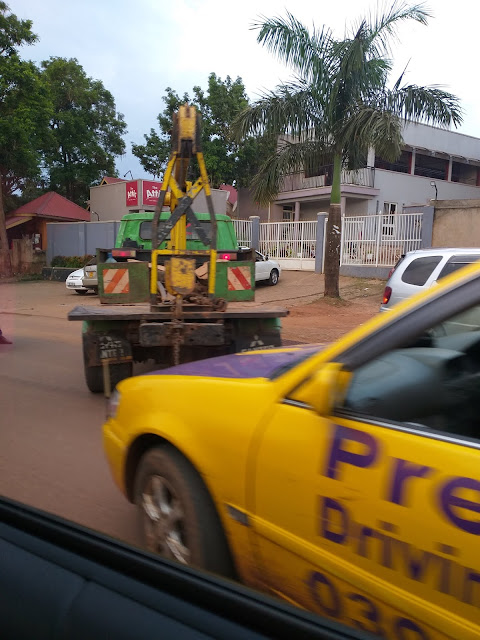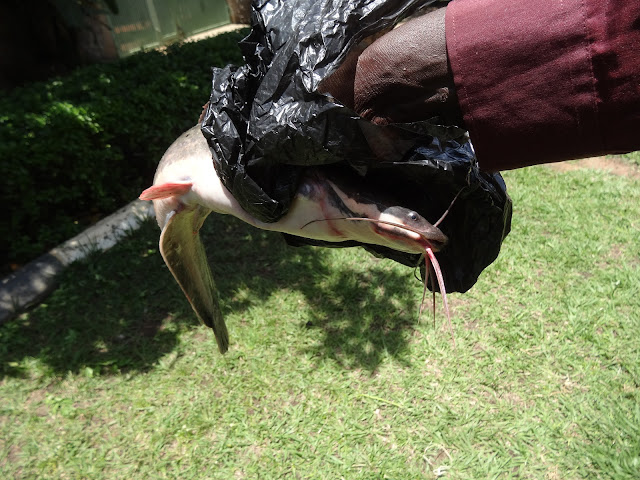By Anthony:
As many of you know, I've been able to preach periodically on the radio over the past two years, at the invitation of my friend Richard Okiror, an elder from PAG. He is the one who first taught me about radio ministry. But together Richard and I are expanding the radio ministry he was already doing, together with some young people from our church who are translating for us and also helping us communicate with, counsel, and pray for all the listeners who call us after the broadcasts. Richard is on the left in the picture below.
Here is Moses, one of the translators on our team. Simon is also on our team, but not pictured.
Richard and other pastors continue to preach on Thursday mornings, but now we have started a teaching program every Saturday evening, from 6-7pm East Africa Time. Rather than preaching, the Saturday evening times are for teaching on deeper topics. We believe teaching over the radio is a powerful and effective way to teach church leaders and disciple and equip church members for ministry. Radio is very popular here especially since most of the population does not have easy access to the internet or smartphones.
You can listen to us live any Saturday if you want to
Here. The broadcasts are not recorded, so you have to be online at the exact time. Saturday evenings are the best time to have our radio program according to our friends and church members here, as people are sitting around together at home, and they can listen while relaxing or while preparing their evening meal. We are grateful to the radio station for giving us the exact time that we wanted.
We use ETOP radio station, 99.4 FM, which is the most prominent and listened to station in our region. It primarily targets the Teso region of Uganda, and so we translate everything, so that people hear both English and Ateso. We have notified pastor contacts around the country so that they can help spread the Word to people to regularly listen to our program. It's been fun having friends call me after each radio broadcast, some of whom I haven't seen in years.
Our teaching program is unique. I’ve been told by Ugandan friends that many pastors from various denominations preach on the radio but their messages are often not very deep, not very biblical, and very repetitive. Unfortunately many of these preachers simply preach the prosperity gospel every week. So on Saturday evenings we are giving theological teaching. People are hungry for knowledge and for God's Word. Unfortunately, the church culture sometimes makes it seem like theology is a secret reserved for pastors. We will teach on deep topics, but slowly and carefully in a simple to understand way. Possible topics could include: theology, justification and sanctification, mission and evangelism, church history, poverty, alcoholism, caring for people with disabilities, pornography, spiritual disciplines, marriage, and more. Since we are in a time of crisis, I have been teaching about the role of suffering in the Christian life and God's providence.
I will be the usual teacher in the Saturday evening time. But once life returns to normal, I will be away half of the time at meetings and trainings, so other pastors from Soroti that we work with will be invited to teach on various topics whenever I am not there.
I'm also indirectly trying to combat the false teachings, false prophecies, and fake news articles that are spreading widely throughout Uganda by social media and word of mouth. It makes me furious how easy it is to create a simple social media post from scratch, something that sounds true but isn't, and then it spreads to millions of people within a few weeks. And some of these fake articles not only create widespread fear and panic, but they could cause people to make foolish decisions that will result in their deaths (such as trying to cure covid-19 through hot water and lemon, or refusing to take any vaccines for anything).
We receive questions at the end of each broadcast, and answer those questions at the beginning of the next broadcast. We also give optional “homework assignments” that people can do for follow up study or application. We will also suggest action plans or have people call in live to suggest possible action plans to be done as an individual, family, church, or community.

We have already seen very good results from this ministry including people calling us to commit their lives to Christ over the phone. We then try to connect them to churches we know or local churches in their area for follow-up and discipleship. Or people call to appreciate us and ask for prayer. Just in the past two weeks, I have received around 20 phone calls. I counseled a woman who was suffering from domestic abuse from her husband, counseled a young man who is struggling with sexual addiction, counseled a woman whose husband is being unfaithful, and prayed for a man who was suffering from spiritually oppressive dreams.
My other team members as well as our guest preachers receive far more phone calls than I do since they can talk to people in Ateso. We receive calls from PAG members (Pentecostal Assemblies of God), but also people from Catholic or Anglican churches, as well as people who don’t go to church at all. Here are a few (of the many) testimonies so far:
-
“
Thank you so much dear pastors. May God bless you all. The word has really inspired my life. We give him all the glory for what happens. Continue to build us spiritually.”
-
A retired bishop called and said that this was the first time he had ever learned about the doctrine of providence after a lifetime of ministry. He wants to now emphasize it in his preaching.
-
One person was prayed for who needed healing and called again to testify that right after that, he was healed!
-
A lady called and said our program has changed her family already. Her husband was an alcoholic, and now he has stopped drinking. He continues to listen to our program and she is waiting for him to get saved.
-
Pastors are calling and saying our program is equipping them and giving them strength. They say that God took us there for a purpose.




























